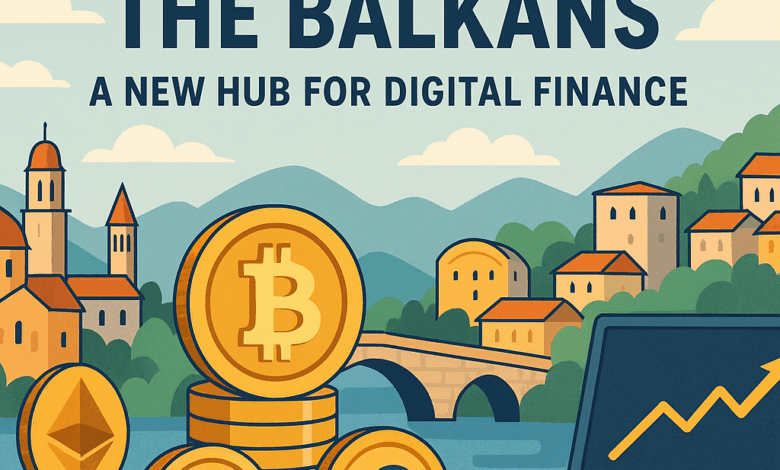A New Hub for Digital Finance

While Europe is moving ahead with the future of finance, we will be discussing how the Balkan region is quickly becoming one of the most exciting and compelling regions for cryptocurrency development and adoption. Whether it’s private retail investors in Sofia, or fintech businesses in Ljubljana and Budapest, we are seeing a rapid wave of our crypto community development that is signifying systemic changes in the way people save, invest and transact.
As stated by the crypto experts from cryptoguide.bg, Bulgaria is experiencing a growth in crypto-related activity in recent years. The increasing technical competence of the population and regulation or policies coming in line with the EU standard is setting in the framework for institutional and retail investors alike to enter the world of digital assets. Local exchanges are appearing, educational initiatives focused on blockchain are gaining traction, and media channels such as cryptoguide.bg serve as a staking ground for responsible crypto adoption.
Rising Exchange Activity and Investment Trends
Across the Balkans, we are seeing an explosive increase in user activity on crypto exchanges. From spot trading on major coins like Bitcoin and Ethereum to increased interest in altcoins and DeFi tokens—we are seeing investors searching for other ways to diversify and protect their portfolios in this uncertain economic climate.
In Slovenia, the boom is being propelled by an established infrastructure and forward-thinking regulatory policies. In a recent report from cryptoguide.si, it was noted that local exchanges have boarded numbers of users at record high levels—representing an increased proportion of younger investors. Slovenia has also positioned itself as a regional leader for crypto payments in the real world—more restaurants, hotels, and online retailers are accepting crypto payments.
While, in Hungary, the amount of cryptocurrency will increase. The experts at cryptoguide.hu have conducted an analysis of Hungarian private investors, interested in new financial products, created and backed by security tokens, stable or not. Hungary will increase interest in blockchain related financial products, because of certain legal rules. The country’s fintech sandbox offers a controlled environment for testing products, attracting the attention of blockchain developers and new startups testing financial applications. In short time, we will see more crypto and blockchain development in Hungary.
Regulation and the EU’s MiCA Framework
The regulatory environment in Europe is changing quickly, and the Balkans are not falling behind. Balkan countries are aligning their crypto regulations with the EU’s newly developed Markets in Crypto-Assets (MiCA) framework, which will create a uniform set of regulations across all EU member states. This not only helps with consumer protection, but it increases confidence for investors alike.
For example:
- Bulgaria started implementing stricter KYC/AML regulations today, requiring crypto exchanges to comply with the requirements of identifying their customers and the audit trail of the funds being exchanged.
- Slovenia has created a licensing framework, declaring crypto platforms to be operational but supervised – therefore permitting foreign investors and foreign developers into the market.
- In Hungary, regulators have initiated dialogue with blockchain firms, providing clearer guidance on crypto tax regulations, initial coin offerings(ICO), and the security of digital assets.
- Per the European Central Bank, without regulatory clarity, we cannot expect the crypto market to develop healthily. The ECB firmly states that we need one unified set of laws, in order to help mitigate any financial implications whilst nourishing innovation.
Why the Balkans Matter in Crypto’s Global Growth
There are a number of key factors contributing to the growth of crypto adoption in the Balkans:
- High volumes of remittance: With millions of people living abroad, remittance via crypto is cheaper and faster.
- Hedging against inflation: People will inevitably turn to stablecoins and Bitcoin in countries where local currencies fluctuate wildly, to preserve value.
- Startup-friendly climate: Overall, talent, tech hubs, and welcoming ecosystems exist in countries such as Sofia, Hungary, and Ljubljana supporting blockchain and fintech startups.
- Crypto education: Platforms such as cryptoguide.bg, cryptoguide.si, cryptoguide.hu are helping fill the education knowledge gap; offering expert guides, established & developing market analysis, and updates on ever-evolving regulation to all ranging from beginners to seasoned professionals.
As adoption increases, we will likely see more partnerships emerge between local governments, fintech companies, and global exchanges. It is possible that Balkan countries will not only become adopters but leaders in the space of digital finance innovation in Europe.
Read More on Regional Crypto Trends
If you’re interested in deeper dives, explore our internal articles like:
And don’t miss our categories:
Conclusion
The Balkans have transitioned from being a potential rising star to a legitimate mainstay of the global crypto ecosystem. There is high user adoption, active local exchanges, friendly legislation, and it is demonstrating to the world that small markets can produce great financial revolutions. These countries, with Bulgaria, Slovenia, and Hungary as the front-runners, are primed to challenge larger economies in respect to crypto. Continue to follow updates from professionals at cryptoguide.bg, cryptoguide.si, and cryptoguide.hu as the region continues to make its stamp on the future of finance.
Source link




